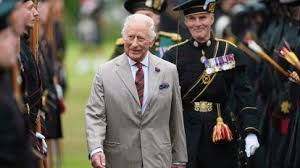‘Extraordinary courage, compassion’: King Charles III’s message on 20th anniversary of 7/7 London bombings

London, July 7, 2025 – King Charles III has paid tribute to victims, survivors, and heroes of the July 7, 2005 terrorist attacks in London. His message on the 20th anniversary reflected sorrow, compassion, and a renewed call for unity.
A Day That Changed the Nation
On that day in 2005, four suicide bombers struck during morning rush hour. They targeted three Underground trains and a bus in Tavistock Square. The coordinated attacks killed 52 people and injured over 700. It was the worst terrorist incident in the UK since Lockerbie in 1988.
The memory of that tragedy still haunts many. Across London, people gathered today at Hyde Park’s 7/7 Memorial, Tavistock Square, and St Paul’s Cathedral. Survivors, families, emergency responders, and leaders stood in silence to remember and reflect.
The King’s Message: Courage and Compassion
In a statement from Buckingham Palace, King Charles remembered July 7 as “a terrible summer’s day.” He sent his “heartfelt thoughts and special prayers” to everyone affected by the attacks.
He highlighted the courage of first responders, transport workers, and everyday people. Many ran toward danger to save others. Charles described these moments as “extraordinary stories of courage and compassion.”
“In remembering the victims of the attacks, we also honour the spirit of unity that emerged from tragedy,” the King said. “That spirit defines who we are.”
Charles, then Prince of Wales, visited victims in hospitals just days after the attacks. Now, as King, he used the anniversary to remind the nation of its resilience and shared humanity.
Two Decades of Change
In the 20 years since the bombings, the UK has worked to improve its security and emergency systems. Intelligence sharing, anti-radicalization programs, and community engagement have become stronger. These changes aim to prevent future attacks and respond more effectively.
King Charles called on the country to continue promoting unity and mutual respect. He urged citizens to “build a future where unity defeats division and peace overcomes fear.”
Leaders Echo the Message
Prime Minister Keir Starmer attended a memorial and laid a wreath at Hyde Park. He said the tragedy changed Britain forever but also revealed its strength.
“We remember the victims. We honour the survivors. We renew our vow that hatred will never defeat hope,” Starmer said.
Home Secretary Yvette Cooper also attended the event. She called July 7 one of Britain’s darkest days. She warned that extremist threats remain, including far-right terrorism and cybercrime.
“We must never forget the lessons of 7/7. We must remain united and prepared,” Cooper added.
Stories of Survival and Strength
Many survivors of the bombings have spent years turning pain into purpose. Some advocate for trauma recovery, emergency planning, or interfaith dialogue.
Rachel North, a survivor of the King’s Cross explosion, addressed the crowd at Hyde Park.
“I never chose to be part of this story,” she said. “But I chose how to respond. I chose to build bridges and never forget.”
Others echoed that message. Despite their trauma, they found healing through community and advocacy.
A Lasting Legacy
The 7/7 bombings left a deep scar. But they also sparked reflection, reform, and resilience. Every year, memorials ensure that the victims are not forgotten. This year’s 20th anniversary reminded the country of how much was lost—and how much was gained in solidarity.
The London of today still remembers the fear and pain. But it also remembers the strength and bravery that followed.
Moving Forward with Unity
King Charles’s message asked people to go beyond mourning. He urged them to commit to a future built on understanding and compassion. His words resonated with many, especially those still grieving or recovering.
“Let this anniversary inspire unity, not division,” he said. “Let compassion lead our way forward.”
The ceremonies may have ended, but the memory and message of 7/7 live on. As the nation moves forward, it carries a legacy shaped not by hatred—but by courage, compassion, and hope.






